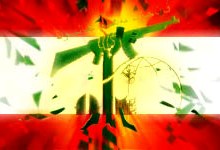 By RITA DAOU
By RITA DAOU
A year after its hard-won formation, Lebanon’s unity government has achieved little and could fall due to a political crisis over a UN-backed probe into ex-premier Rafiq Hariri’s murder, analysts say.
”The government has failed at all levels in addressing any key issues of concern to citizens,” said Mohamad Chamseddine, an analyst with Information International, a Beirut-based research center. ”It hasn’t accomplished anything because of a lack of political will linked to the fact that there are two currents within the cabinet, each with its own agenda,” Chamseddine told AFP.
The 30-member cabinet headed by Prime Minister Saad Hariri — son of the slain ex-premier – includes ministers from Lebanon’s two fractious camps: one loyal to the premier’s Western – and Saudi-backed bloc and the other to the powerful militant group Hezbollah supported by Syria and Iran. The cabinet was formed on November 9, 2009, after more than four months of arduous negotiations.
But initial optimism quickly gave way to scepticism and a deepening sense of gloom as the two camps have hit a brick wall over a host of issues, especially Hezbollah’s arsenal and the Special Tribunal for Lebanon (STL).
The UN-backed tribunal was set up in the aftermath of the 2005 assassination of Rafiq Hariri and there are unconfirmed reports that it plans to indict Hezbollah members in connection with the murder. The Shiite party has warned against any such outcome, accusing the STL of being part of an Israeli plot and calling on the Lebanese not to cooperate with the investigation.
Analysts predict the crisis over the tribunal will lead to a total paralysis of government institutions and possibly the fall of the cabinet, a scenario similar to the political deadlock that came close to civil war in 2008.
”There is a duality of power in this government,” said Imad Salameh, political science professor at the Lebanese American University. ”We have a state and a quasi-state (Hezbollah) who have to agree on international law,” he told AFP. ”The quasi-state says that the STL is irrelevant and the state says that Lebanon is a founding member of the United Nations and abides by UN resolutions. ”The government is now in an impasse over how to resolve this duality of power,” he added. ”It has become the hostage of the indictment.”
Salameh said even the rapprochement between Hariri and Syria, which was forced to withdrew its troops from Lebanon in 2005 following international outrage over Rafiq Hariri’s killing, was only holding by a thread.
A swirl of diplomatic visits in past months, including by the Saudi, Syrian and Iranian leaders as well as a host of Western officials, has failed to break the deadlock and ease tensions as Lebanon awaits the STL indictments.
The work of government institutions, meanwhile, has nearly ground to a halt, adding to the sense of foreboding among ordinary Lebanese. mb
Leave a Reply
You must be logged in to post a comment.